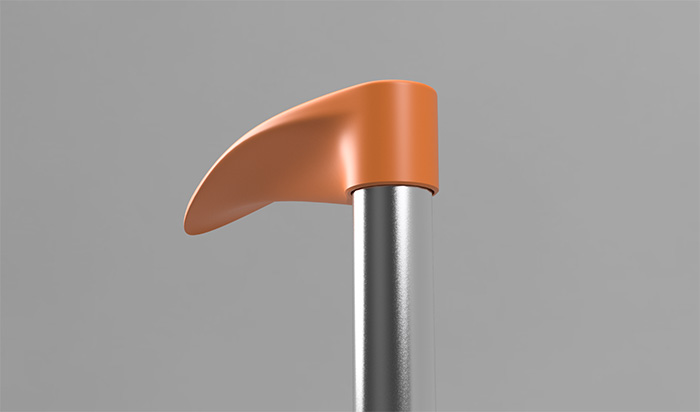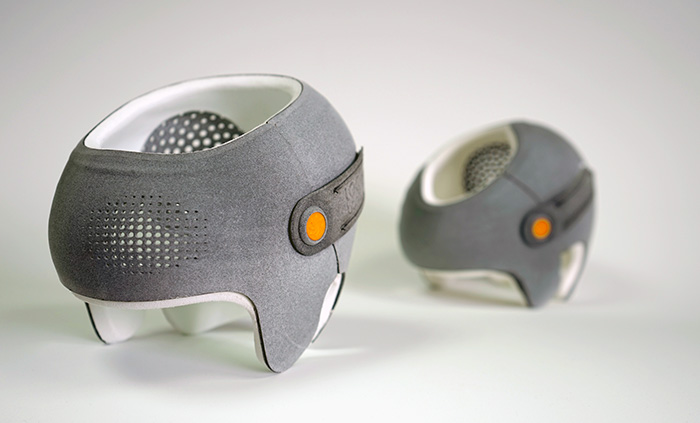3D printing refers to the process of building a three-dimensional object from a digital file. It was originally used for fast prototyping of industrial products and designs. By applying 3D printing techniques to orthotics, we can achieve a number of benefits for our patients.
Because 3D printing works by building an orthotic layer by layer, it allows us our orthotists far more flexibility in designing and manufacturing innovative and bespoke orthotics. This means that we can achieve treatment for our patients that are simply not possible within traditional manufacturing techniques.
For example, we can create an orthosis that has very precise variations in degrees of thickness and pressure, for maximum therapeutic impact. At the same time, we can manufacture orthoses that are lighter and cooler, and therefore more comfortable to wear.

We are developing some exciting new products at LOC that harness state-of-the-art design benefits thanks to additive manufacturing (3D printing).
Having purchased our first Markforged Mark II printer for small in-house engineering developments, we can now print continuous carbon fibre, kevlar and high tensile glass fibres.
This gives us greater freedom of design and engineering, whilst aiding our manufacturing team in the form of jigs, fixtures and devices for orthotic assessments.

Our in-house design team have developed the all-new LOCband-Lite based upon HP's Multijet Fusion technology (MJF). The 3D printed cranial helmet features a lightweight design thanks to the thinner wall thickness and vented meshes.
This has a number of tangible benefits for our patients: it is cooler and more comfortable to wear due to greater heat dissipation and reduced neck strain from the lightweight design.

We have the following facilities and amenities at our Kingston Upon Thames location:
We also have the Gait Laboratory for orthotics patients and Onsite Manufacturing for speedy turnarounds and adjustments whilst you wait.
We have the following facilities and amenities at our Cambridge location:
We have the following facilities and amenities at our Bristol location:
For more information, visit Litfield House Medical Centre.
LOC’s clinic is based in the University of Salford’s Podiatry Department and provides treatments for orthotics, scoliosis, pectus deformities, positional plagiocephaly and club foot.
It is also the base for LOC’s northern OSKAR clinic which is run by Sam Walmsley, clinical director of LOC, in conjunction with Elaine Owen MBE MSc SRP MCSP.
We have the following facilities and amenities at our Romford location:
Parking:
There is NO parking directly outside the clinic. These spaces are reserved for residents.
The nearest parking can be found at Billet Lane public pay & display opposite Queens Theatre, a 2-minute walk from the clinic.
Click here for more information about Best Health Clinic
Due to COVID-19, we have had to temporarily close the Salford clinic and are operating out of another clinic in Bolton.
508 Blackburn Rd,
Astley Bridge,
Bolton
BL1 8NW
For more information, please visit The Good Health Centre

Join The London Orthotic Consultancy in celebrating Cerebral Palsy Awareness Day on March 25th. Learn just how important expert orthotic care is in enhancing mobility, independence, and quality of life for children and adults with cerebral palsy.

Introducing the Agilik™ smart orthosis, a cutting-edge, powered knee orthotic now available in the UK through the London Orthotic Consultancy. Unlike traditional KAFOs or heavy exoskeletons, the Agilik™ provides dynamic knee assistance and offers real-time support, reducing fatigue and improving posture. This pioneering, modern technology can help children and adults with lower limb weakness walk more efficiently and naturally. We are honoured to be selected as the exclusive paediatric specialist centre in the UK for the Agilik™ device.

When Sophie noticed her baby Max had a persistent flat spot on his head, she was told it would resolve naturally—but it didn’t. Seeking a second opinion led her to the London Orthotic Consultancy, where Max was diagnosed with severe plagiocephaly.

A little more than four years after the LOCband Lite's launch, we're proud to have successfully treated our 250th helmet therapy patient at our Romford clinic using our cutting-edge 3D-printed cranial band. After five months of treatment, her final scan showed that her asymmetry had decreased from 12 mm to 3 mm.

Sky News published an article this month quoting scientists at Southmead Hospital who claimed there was a lack of research into flat head syndrome and its treatment with cranial remoulding (helmet) therapy. This is our response.

With our non-surgical treatment plan, Alex achieved 100% chest correction in just two years. His treatment involved a combination of dynamic chest compressor and vacuum bell therapy treatment to address his pectus excavatum and rib flaring.

Learn how a custom carbon fibre AFO helped Gill regain mobility and comfort despite complex challenges from shin bone (tibia) removal. We created a truly tailored orthotic solution made from pre-preg carbon fibre at our Cambridge clinic.

Discover how bespoke orthotics and the OSKAR program with Elaine Owen transformed Archie’s life with cerebral palsy quadriplegia, helping him avoid a wheelchair and achieve greater mobility.